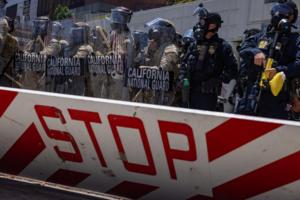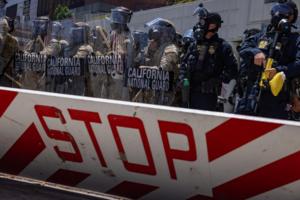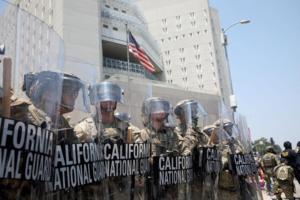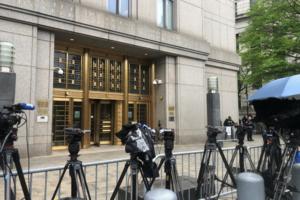Politics
/ArcaMax

Commentary: Federalizing the state National Guard is a chilling push past the law
The use of the military to quell protests is something associated with dictators in foreign countries, and as of Saturday night, with a president of the United States.
When President Donald Trump federalized 2,000 members of the California National Guard, deploying them because of protests against federal immigration authorities, he sent a ...Read more

Editorial: Trump should show some Ukrainian resolve and press Putin to end the war
Ukraine’s audacious drone attack on Russian air force bases was a remarkable display of courage and resourcefulness. While the full extent of the damage is still unknown, the destruction of several strategic bombers is another reminder that Kyiv remains determined in its struggle against Moscow’s invasion.
President Donald Trump should find...Read more

Commentary: What have we learned since George Floyd's murder?
Five years is a blink in American history—a nation built on contradiction, striving, and unfinished business. It was five years ago that a Minneapolis police officer extinguished the life of George Floyd, and the world has felt the tremors.
I watched, powerless, as the video looped and looped on screens large and small. Still, I recall the ...Read more

Robin Abcarian: Did the MyPillow guy, clinging to the Big Lie, defame a Dominion exec?
There's a line in Eric Coomer's defamation lawsuit against Mike Lindell, the MyPillow guy, that strikes me as the perfect description of what happens when influential partisans belch lies about innocent people in these insanely charged political times:
"The real world consequences for the subjects of those lies," says the lawsuit, "have been ...Read more

Noah Feldman: The National Guard deployment in LA is a threat to democracy
President Donald Trump's deployment of the National Guard to Los Angeles, over the objection of California Governor Gavin Newsom, represents a structural threat to democracy. The law on which Trump relied permits domestic deployment only in cases of invasion by a foreign nation, rebellion, or danger of a rebellion.
Newsom said he intends to sue...Read more

Commentary: A new economic patriotism, not a new gilded age
America is more divided than ever, not just along party lines but by an economic fault line.
On one side, tech hubs like Silicon Valley — home to Apple, Google, Nvidia and Tesla — are amassing vast amounts of wealth.
On the other side, manufacturing towns like Warren, Ohio, and Johnstown, Pa., are suffering from decades of disinvestment ...Read more

Marc Champion: Ignore Greta Thunberg's circus, there's a real path to help Gaza
Sometimes it takes a self-indulgent public-relations stunt to remind us of what’s important. Monday’s inevitably intercepted aid flotilla to Gaza was one of those occasions.
As the organizers of the convoy intended, the detention of the Madleen — a yacht carrying irrelevant quantities of humanitarian aid — grabbed international ...Read more

Editorial: Hoping for a bond market crash to take down MAGA? Please wish for something else
Americans unhappy with President Donald Trump’s second term have taken to wishing for something they shouldn’t.
If only the U.S. Treasury bond market were to crash, the thinking goes, then Trump would be forced to change his policies. Bond traders could simply knock down the whole economic house of cards and then, presto! Goodbye to tariffs...Read more

Commentary: Making energy abundance a reality -- Upcoming G-7 summit gives US, Canada a unique opportunity
With the upcoming G-7 summit set in Alberta—Canada’s energy heartland—President Donald Trump and Prime Minister Carney are uniquely positioned to champion a bold vision: reasserting and securing North American energy dominance.
Doing so wouldn’t represent just a win for the United States and Canada. It would create a strategic advantage...Read more

George Skelton: Newsom's power play on the Delta tunnel
SACRAMENTO, Calif. — Gov. Gavin Newsom is up to his old tricks, trying to ram major policy change through the state Legislature on short notice. And again lawmakers are pushing back.
Not only lawmakers, but the Legislature’s nonpartisan, independent chief policy analyst.
The Legislative Analyst‘s Office has recommended that legislators ...Read more

Commentary: RFK Jr. is dangerously wrong on fluoride
Robert F. Kennedy Jr. came into a recent Department of Health and Human Services hearing with conspiracy theories, and left with a crash course in dental science.
At the hearing, held on May 13 to discuss next year’s appropriations for the department, which Kennedy heads as secretary, Rep. Mike Simpson, a Republican congressman from Idaho and...Read more

Editorial: Misusing the National Guard -- Trump's LA interference with local policing
Always looking to provoke a crisis, Donald Trump has federalized 2,000 soldiers of the California National Guard against the wishes of the state’s governor to put down a rebellion in Los Angeles that doesn’t exist. And Trump is acting counter to federal law in doing so, which is no surprise for him.
After demonstrators gathered in L.A. to ...Read more

Commentary: What nature taught me about fatherhood after I lost my dad
It was around this time two years ago that I had to say goodbye to my dad. Father’s Day has felt different ever since.
He was a gentle man of conviction who loved his family deeply and instilled in me values that will last a lifetime. A passionate human rights advocate, he never hesitated to challenge injustice, and he encouraged me to ...Read more

Editorial: That hazy sky out there isn't harmless
This week as temperatures finally reached acceptable June levels, Chicagoans prepared to step outside — onto patios and rooftops, into a park or along our gorgeous lakefront.
Everything looks relatively normal out there. But it’s not. The Illinois EPA reported Thursday that the Chicago area’s air quality is unhealthy, not just for ...Read more

Anita Chabria: At Sean 'Diddy' Combs trial, the women testifying are on trial too
Did she scream? Was it loud enough? Was her dress torn enough to prove she fought?
These were some of the questions faced by 17-year-old Lanah Sawyer in 1793 during one of America's first rape trials, which ended in an acquittal for the wealthy "rake" who assaulted the teenager.
As Week 4 ends in the sex trafficking and racketeering trial of ...Read more

Editorial: High price of the Trump roundups -- Stephen Miller wants to deport law-abiding immigrants
President Donald Trump’s campaign promise to deport “violent criminal illegal aliens” won him votes, but has now become a far broader effort ensnaring millions of law-abiding people living and working productively in all parts of the country.
And who are these dangerous foreigners?
They’re watching your kids. Building your homes. ...Read more

Mark Gongloff: Heat is bad for workers' health. RFK Jr. doesn't care
We’re on the verge of what will probably be one of the hottest Northern Hemisphere summers in human history. In early May, the water in the English Channel was already so hot that octopuses invaded it, inspiring Bloomberg News’ Joe Wertz to dub this “hot octopus summer,” and not in a fun, Megan Thee Stallion way.
Soaring temperatures, ...Read more

Commentary: Police use of military tools presents a growing danger
The White House recently issued an executive order titled “Strengthening and Unleashing America’s Law Enforcement to Pursue Criminals and Protect Innocent Citizens.”
Claiming that local leaders “demonize” law enforcement and shackle it with “political handcuffs,” the order directs resources toward expanded police training, higher ...Read more

Editorial: No winner to declare in Trump-Musk feud
The bitter feud that broke out this past week between Elon Musk and President Donald Trump is more than bravado gone bad. It highlighted the ugly, juvenile tendencies of both as they aired a personal grudge on a global scale.
As bizarre and, admittedly, entertaining in a sort of WWE way, it proved, there were no winners to declare. Not Musk, ...Read more

Ronald Brownstein: This Republican agenda is generational theft
The highest price for President Donald Trump’s second-term plans will be paid by those who are not yet born.
Yes, it’s true that today’s lower- and middle-income families will shoulder a large share of the cost — and that’s what’s getting most of the attention as Republicans push through the One Big Beautiful Bill Act, a budget ...Read more























































